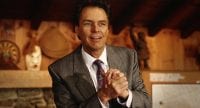“Twin Peaks: The Final Dossier – A Deep Dive Review and Analysis (Part 2)” is now available on Audio, read by the author, John Bernady, exclusively for our Patreon supporters. For just $3 a month you will have access to our full library of Audio content, plus three new uploads every week. To sign up visit our Patreon page: https://www.patreon.com/25YL
Life is what it is, a gift that is given to us for a time—like a library book—that must eventually be returned. How should we treat this book? If we are able to remember that it is not ours to begin with—one that we’re entrusted with, to care for, to study and learn from—perhaps it would change the way we treat it while it’s in our possession.
These words from Margaret Coulson in Mark Frost’s The Final Dossier begin to tell us the most important things characters need for their spiritual health, but it’s a thesis statement for the readers as well. With the meta-statement of “how should we treat this book?” Frost is giving us advice on how we should think about using the time and energy we have in our own lives.
Why is it Margaret who presents the message we’re supposed to receive? Because she always does. She had her warnings for Laura in Fire Walk With Me, messages for many characters in Seasons 1 and 2, and she delivered the episode introductions (made for its syndication on Bravo) that up until Season 3 were the final bits of Twin Peaks, created personally by David Lynch when Twin Peaks was dead as a doornail. These were Lynch’s final insights and he went with Catherine Coulson and her character the Log Lady to deliver them. Now, Mark Frost is using the Log Lady to reframe the struggle of Twin Peaks to a personal level both within Twin Peaks and for the viewer. Why wouldn’t she reframe the struggles in this book in a teachable way for us?
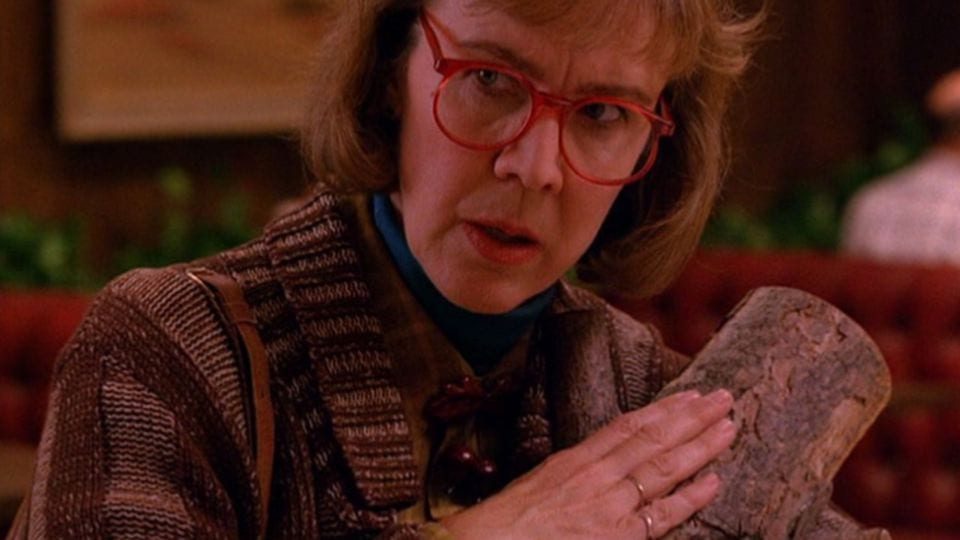
HER LOG HAS A MESSAGE FOR YOU
Up to this point in The Final Dossier (about two thirds of the way through), we have seen cycle after cycle of characters meeting their various levels of trauma and doing one or more of three things:
- Embracing a positive response.
- Succumbing to a negative response.
- Being trapped in the middle unable to move forward or backward.
The words from within Margaret’s case file are advice to every single one of these characters for choosing the positive choice. Hers is the culmination of how to live one of the good lives rather than be swallowed up by the darkness.
In this same statement (being read by Hawk at Margaret’s own funeral), she writes “my log has this to say: The answers to all our questions are in the wind and the trees, the rocks and the water.” These are the same places where electricity is humming according to her during her phone call to Hawk in Part 10, by the way. The answers to all our questions deal in electricity, and therefore energy with positive and negative forces. And I don’t need to talk about what that could possibly encompass.
Margaret continues: “No one is helpless. No one is beyond helping. It is good to seek out those who need us and do what we can for them. I recommend that.” This book reinforces the theme that helping is part of positive energy flow, and with “no one is helpless,” also reiterates Lawrence Jacoby’s earlier message of Personal Accountability embodied by “shovel yourself out of the shit.”
Margaret writes: “Don’t be sad. Be happy to have another day to do what needs doing.” It implies sadness is an emotion associated with being stuck in place. She goes on to say there is no light without darkness and we should make peace with that. And, whether we see that as a metaphor or fact “both tell us that time—and light, and darkness—move in cycles. We move through them, too, often as passengers, but if our eyes are open, there is much to be learned along the way. A traveler learns more than a passenger. When darkness comes, a traveler learns to be brave, for they know the light will return.”
Not only do I think that last paragraph is one of the most important in Final Dossier, I think it makes one of the most important distinctions in this modern period of Twin Peaks. Mark Frost repeatedly presents us with case studies of passengers and travelers, and how one often becomes the other by losing control or by proverbially taking the wheel. And I get the distinct impression Frost wants us to “treat this book” as a way to “remember” to be an active participant in our own lives before time gets away from us.
Margaret continues her advice in a particularly Peaksian fashion:
When darkness comes, just as you would at night, hold the light inside you. Others, I can tell you, have already learned to do the same. In time, you will learn to recognize light, in yourself and others. In this way you will find each other. Together you will make the light stronger.
This truth I know sure as the dawn: Darkness will always yield to light, when the light is strong.
The first 80 pages of this book deal with residents of Twin Peaks living out cycles of light and darkness (without explicitly saying this is what we’re seeing). Some characters in this book find their light, and then accept help as well as offer it to others, like Shelly Johnson. Some characters become lost in the darkness like Gersten Hayward. Many of them spend time in the darkness before finding their way to their light like Ben Horne or Gersten’s sister Donna. Then on page 81 we read about Dr. Jacoby’s exploits and we see him organically acquiring the means to deliver the message of personal accountability (and intrapersonal alchemy) that is the worldly version of Margaret’s message before hearing from Margaret herself as I’ve described above.
THE TRAVELERS
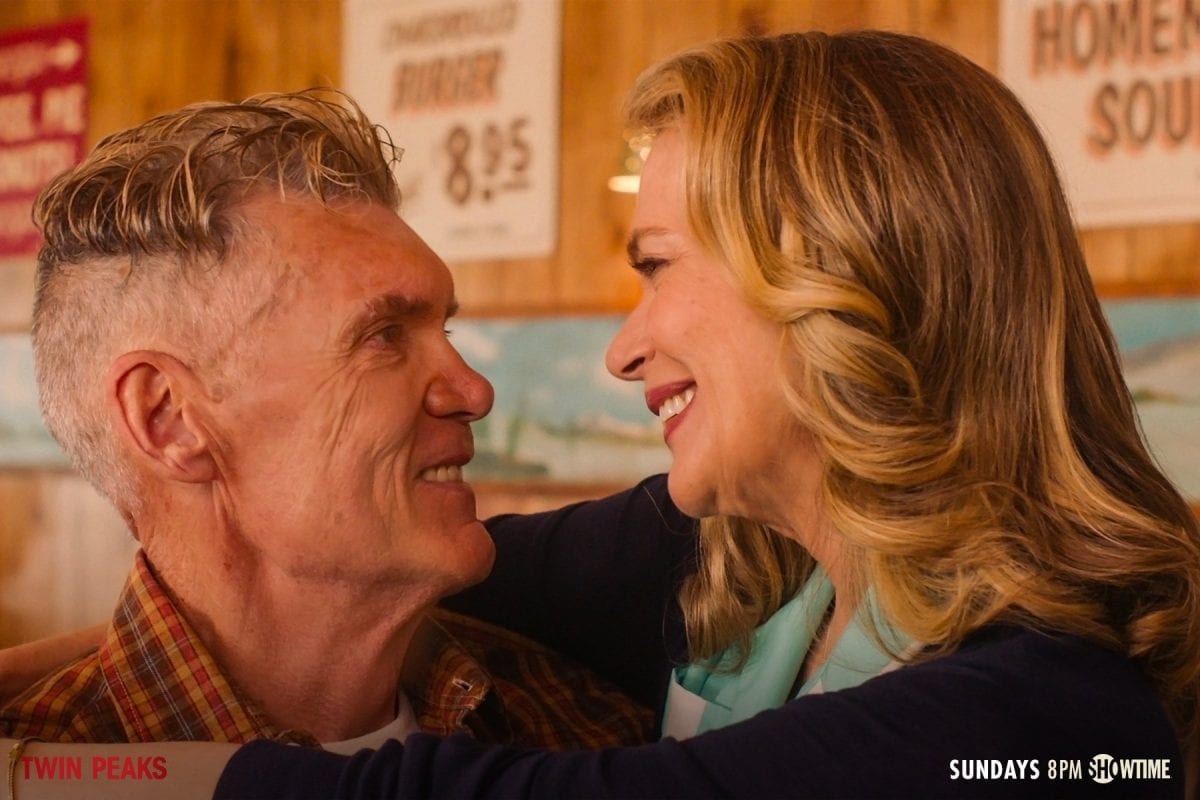
Shelly Johnson
Once the book begins in earnest (after the Leo Johnson autopsy report), we begin with the early life of Shelly Johnson. The part of her life documented in her file is a microcosm of the personal struggles of everyone: She was in love with Bobby, and was hurt by cheating so she marries Leo and enters a dark period of her life. After Leo and Laura die, she overcomes her bad decisions, begins again by marrying a supportive person (Bobby, again with a foundation in love rather than the fear that sent her into the relationship with Leo) and otherwise chooses to be helpful whenever she can and accepts help from people such as Betty Briggs and Norma. An entire diner helps her raise her daughter. In two pages we see an arc that character after character goes through within this book, and we see how help from within the self and from others is the key to a successful life. We also are presented with cycles coming and going, but that’s for Part 3 of my deep dive into this book.
Ben Horne
Ben Horne’s period of darkness begins with two explosions on the same day: the bank explosion that put his daughter Audrey into a coma, and the explosion of truth presumably about Donna’s true parentage. His whole selfish life up to that point hit a crisis point that night and literally ended by his head being thrown at a fireplace. He leaned into this darkness as he dealt with the fallout of the explosions by selling his once-all-important parcel of land to the ultimate passenger, a company that built the private prison and, rather than taking responsibility and running it positively and ethically, merely raked in profit from it and otherwise did nothing as the prison’s darkness exuded and permeated into every resident of Twin Peaks.
Once Ben recognized what he’d brought into his home town, he took responsibility for this fact. Rather than being a glad handing dandy, he began anonymously taking care of the people who needed it, paying for the bills of Eileen Hayward and Annie Blackburn (for a few examples of presumably many). Though he can’t get a clean break from his trauma as the prison continues to exist, Ben is actively fighting against the prison’s effects whenever he can. That to me says Ben has become a traveler.
The Haywards
Donna Hayward starts at a low point in this book, seemingly unable to deal with the truth explosion of her real father, though they don’t say what the actual issue was in this book. This was traumatic enough to send Donna into a fast lane of fame and drugs among other distracting concepts. She avoids her family. Barely contacts friends. She goes into the dark alone, and stays there for a very long time until her mother died and she was finally able to reframe her pain from her family’s lie that hurt her so deeply.
She goes into rehab for the fourth time and only then stops being a passenger. She simplifies her life. She reconnects with Will Hayward and goes to work with him in an off-the-radar town in Vermont. She takes personal responsibility for her life by becoming a sponsor in a number of 12-step programs and is in the process of becoming a nurse practitioner.
This is exactly what Will Hayward did right away back in 1989. He needed to leave the source of his trauma (Eileen and Ben) and he settled down in Vermont and immediately went into practice helping people as he could. Harriet Hayward also followed this trajectory by going to school and then becoming a pediatrician just outside Seattle.
Big Ed and Norma’s love
Norma Jennings helps people her whole life (especially Annie), but puts her heart into helping her business thrive rather than into her personal needs. Once she focuses her attention from her business to her own heart, she goes with Ed into a happy finally completely fulfilled life. Nadine Hurley finally realizes (thanks to Dr. Amp’s message) she needs to work on herself too, rather than putting it on Ed to keep her propped up as a safety. Once she realizes her own strength she knows that she needs to let Ed go so he can find his own truest happiness. Ed, like Norma with the Diner, put his whole heart into helping others to the detriment of his personal needs. Once he stopped feeling like it was his duty to help James stay on the straight and narrow or keep Nadine’s head up, he was able to take care of himself, and that meant going over there and nabbing that lady who helps his inner light shine more than anybody. And James by the way had a similar arc to Donna in that once he got over his wanderlust, he settled down, bought a simple car and lives in a simple place, and works a simple job where he can help people (albeit his help is as a security guard, but could you see James going into the medical profession?).
THE PASSENGERS
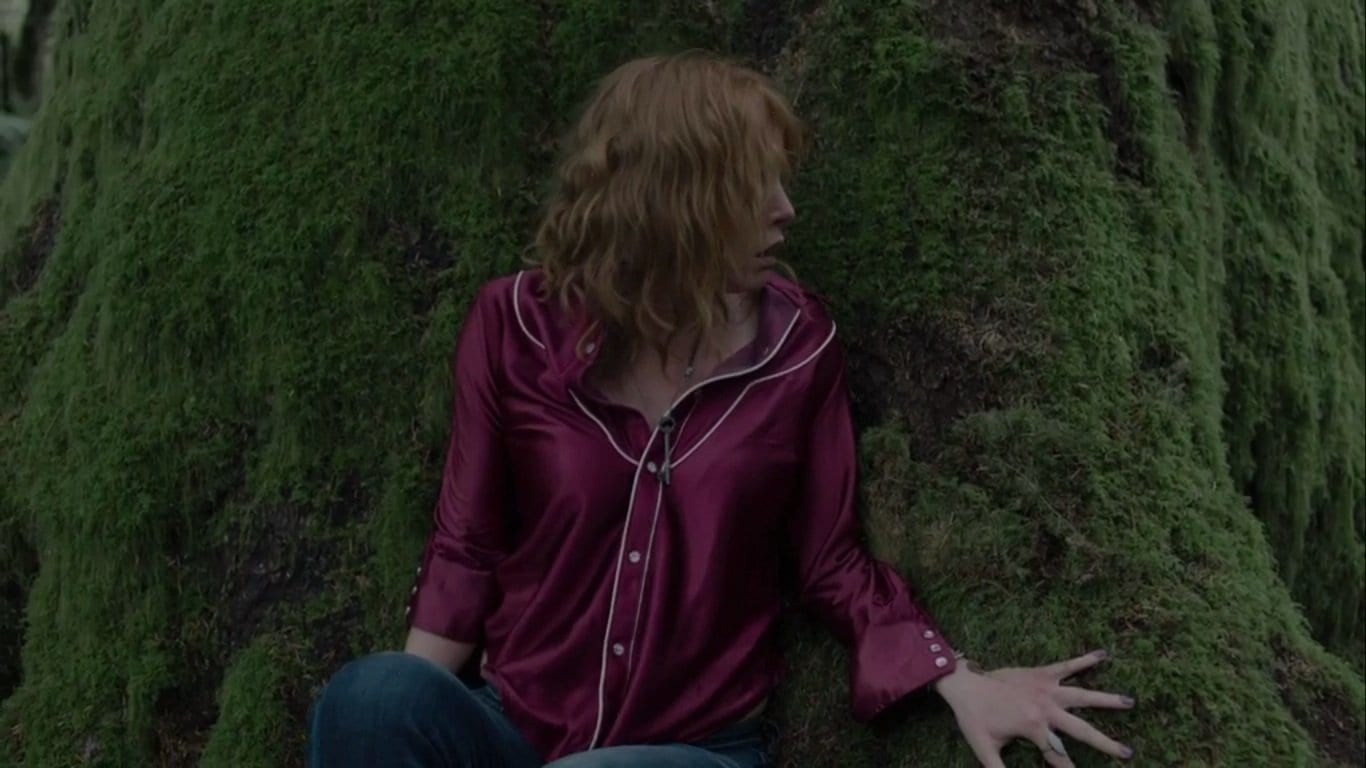
Gersten Hayward
Gersten was a prodigy, but eventually succumbed to the pressure and was unable to succeed from that moment forward. Rather than helping herself or accepting help, she looked to drugs and unhealthy relationships such as Steven Burnett even after he married Becky Briggs. She chose the darkness rather than personal accountability.
Annie Blackburn
Annie, in her current state as a hospital resident, seems like she’s at peace in a way very similar to Cooper when he was stuck inside Dougie Jones, yet every year to the minute of her moment of trauma she comes back to the world and says “I’m fine.” She is a near-perfect expression of living constantly in the moment as a passenger, yet her body never forgets—cannot let go of—her moment of trauma no matter how many years away she is from that night in the Lodge. This is why she can’t fully wake up. She is a victim of the forces of darkness.
Harry Truman
Harry couldn’t get over the case that got away. The disappearance of Dale Cooper was something he couldn’t handle professionally, and I think his heart believed a good man was taken away before his time. Instead of being able to move through the senselessness, he succumbed to the darkness the town experienced from the prison. And Harry got sick, from all of it. As he stepped back from his position due to the sickness, and we get news of his fixation on the Cooper case, we can see others literally being travelers while Harry is a passenger behind the scenes as his sickness eats away at him.
THE IN-BETWEEN
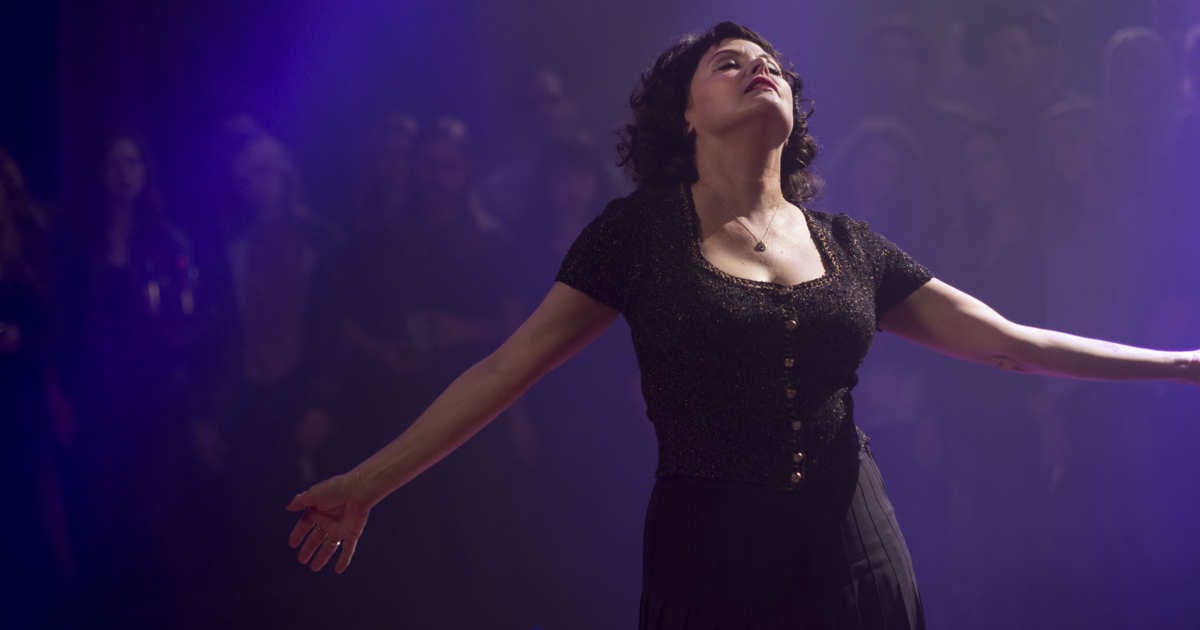
Jerry Horne
Jerry lives his life tuned to a higher wavelength, and he is an ally to Lawrence Jacoby, but he’s always been truest to himself. He helps people’s mental health by creating marijuana-centered products that assist people’s mental health, but he’s doing it to be himself more so than actively helping others. I would say he’s allied with the light, but he’s not an entirely active traveler either. This would certainly explain his arc in Season 3, where he’s most certainly attuned to the energies afoot yet has no ability to navigate safely out of the woods.
Audrey Horne
Audrey similarly experienced a storyline that appears to make her half traveler and half passenger. When she realized she was going to be a mother, she broke off from darkness exuding from the family and became a responsible mother by going into business for herself. She accepted help from Sylvia with raising Richard, so it seems she was able to rise above her physical trauma from the bank explosion and become a traveler in that aspect of her life, but the trauma of the violation and rape by Cooper’s Double seems to be where she will always be a passenger. She outwardly ignores any question of Richard’s father. Either she knows who the father is and can’t deal with it, she’s compelled by blocks to her memory as seems to happen with Lodge-related interactions, or she doesn’t know the father’s identity and can’t deal with any implications that could come from answers. Either way, Audrey Horne looks away from these questions, and looking away is never good.
FORCES FOR DARKNESS
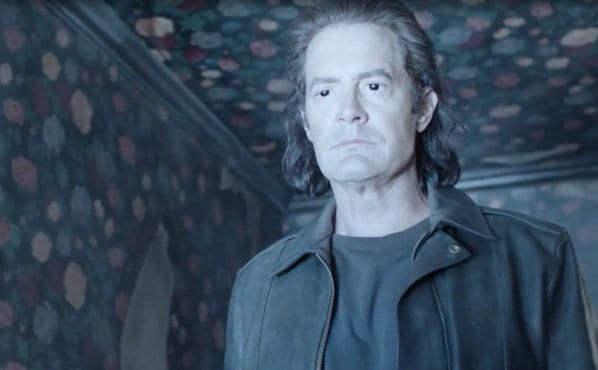
Vivian Smythe
Vivian appears to have tuned her energy to negative frequencies and wreaking havoc wherever she went with no outward signs of repercussions, and in context of this book, I’d call her a human force of darkness that came down on Norma’s family possibly inspiring Norma to avoid starting a traditional one of her own.
Lana Budding
Lana appears to be in league with the darkness so much so that a case can be made she’s an Owl Ring bearer. It sure is interesting that she’s less a character and more an identity that happens to be next to a ton of people who’ve been seen wearing the Owl Ring.
Ghostwood Correctional Facility
The prison, as I’ve said before and will say again, is a literal negative force upon the town’s morale and morals. Its unseen, unnamed landlord is also grouped in this category.
The Double
Dale Cooper’s Double is most definitely a force for darkness as he’s the one who sent Annie and Audrey’s lives into the spirals they can’t seem to get out of. Not to mention he’s actively trying to call a demon to him. There’s a lot about the Double’s story that is worth discussing, but as far as the struggle between light and darkness goes, this is all we need to understand. The Double is distinct from Dale Cooper, and is a force of darkness.
FORCES FOR LIGHT
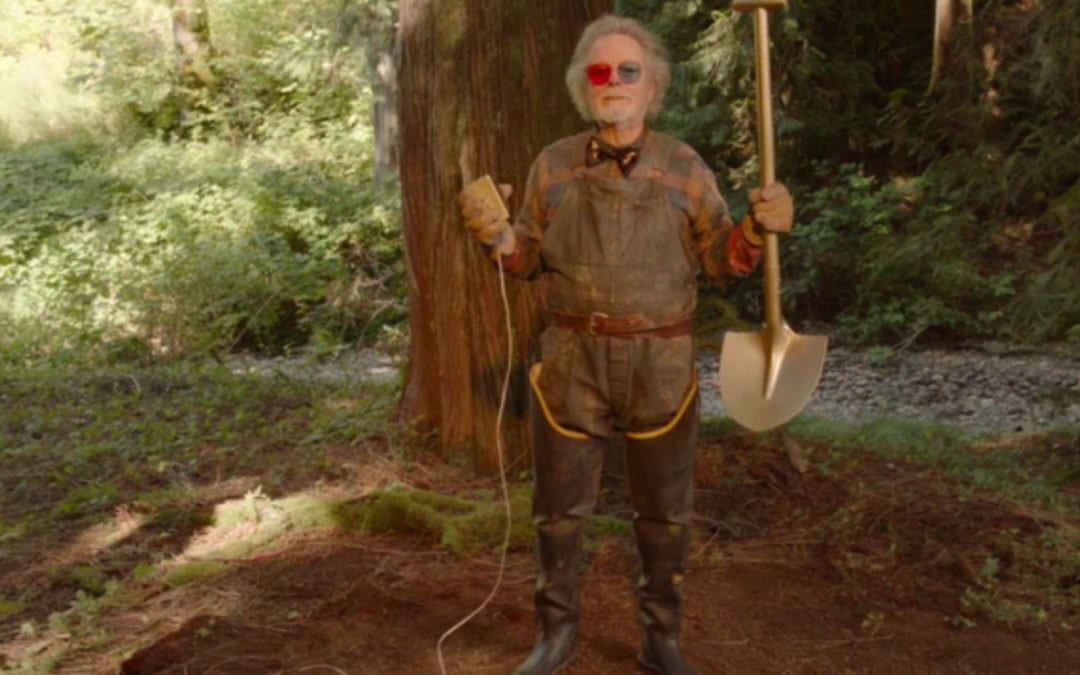
Margaret Coulson
Margaret is of course a force for the light. Since her abduction documented in The Secret History of Twin Peaks, she seems to be on the wavelength of the good guys, so much so that her terminology of light and darkness wins out over golden shovel metaphors for my framework here.
Major Briggs
The Major is more a system of plot delivery in this book, but we know he is allied with the good guys and he knows how to deliver assistance in messages even after he’s died.
Tamara Preston
I believe the explorations within this book solidify Tamara Preston as a force for the light as well, and I will talk about Tamara later on, but for now I need to get to the man behind the golden shovels.
Dr. Lawrence Jacoby
About Dr. Jacoby’s message: I don’t think it’s a mistake we see his prescribed message of personal accountability set in real life practice with Nadine, Ed, Norma and James in the back half of Jacoby’s own file. The end of their arcs, with James simplifying and Ed and Norma getting married, is an illustration of Jacoby’s philosophy brought to life.
It’s also not a mistake that Margaret’s file directly follows Jacoby’s. His philosophy is the worldly application of the Fireman’s balance, and Margaret’s philosophy is the same message but ascribed to our souls on the spiritual level.
At the end of Secret History of Twin Peaks, Jacoby’s ethical code violations led to his losing license to practice and he leaves Twin Peaks for the second time. The first time he left (also in SHoTP), he studied with shamans and went on a vision quest where he met a number of tall humanoids that gave him a reptilian vibe. This second time leaving, he met menehune, “little people” who “revealed to him that they’re not of earthly origin and their mission here on earth is to help steer the “newer root race of human beings” away from our unfortunate genetic propensity for violence and self destruction.””
To me, this says Jacoby met the Fireman and his kind back in the day, and in 1989 he met the Fireman’s coworkers. Which likely makes Jacoby the same kind of triggerable agent as Freddie Sykes, Margaret Coulson, Carl Rodd, Dale Cooper and Gordon Cole. He has absorbed the otherworldly creatures’ messages, then he works through his issues and refines how he can best help his world. He next becomes a “senior spiritual adviser” to the Grateful Dead, becomes a resident fellow with a spiritually leaning outfit named Zonderkamp (but leaves when they think Y2K is the signal of Armageddon), helps Nader voters in 2000 come to terms with Bush winning the presidency, then helps where he could in New York on 9/11. After the Iraq invasion’s reason (weapons of mass destruction) was proven false, Jacoby saw that as “confirmation of his theory that the United States, and perhaps the world, might be entering what hi saw as “Kali Yuga”—an ancient Hindu term for a “dark age.””
This was the point when he knew he needed to return again to Twin Peaks. He simplified his life, lived on the side of a mountain in a simple trailer, accepts some funding from Jerry Horne’s help, and researches the internet as he develops his Dr. Amp personality. His message? Defiant hope, activism, individual responsibility.
As Dr. Amp grew in popularity, he did not let corporations buy into the podcast, and his metaphorical message of “shovel yourself out of the sh*t” became literal with the sale of golden shovels, the profits of which he used only to run his show and then as contributions to charities. The shovels help with a “desired transformation through undertaking this assignment he described as a process of “intrapersonal alchemy,” turning the lead of dull, everyday consciousness into the gold of an evolved human soul, the goal of what he described as a hallowed tradition in esoteric philosophy harking all the way back to the Middle Ages.”
The shovels have two coats of gold paint on them. Jacoby returned to Twin Peaks twice. James Hurley, also within Jacoby’s case file, returned to Twin Peaks twice. They both simplified their lifestyles (much like James, and Donna and Will Hayward) and had the instinct to help people. Much like the two coats making the shovel ready to be used to shovel the user out of the sh*t, it may take certain people two times of going back to starting positions (doubly enforced with knowledge, much as paint absorbs into the shovel, then needs one more paint layer to make sure all of the base material is protected) before they can be ready enough to complete their alchemical journey. Metaphor or fact, it resonates as the same to me.
What I find interesting about this connection is that Dale Cooper (not the Double who is described in this book; the Dale we see in Season 3), also left Twin Peaks twice (disappearing during the events at the beginning of this book, and once more after the events with Freddie at the Sheriff Station). Just like Jacoby and James he tries to help people along the way. And just like Jacoby and James, both times he leaves are under awkward circumstances.
The second time they leave town:
- Jacoby lost his license and needed to find himself.
- James thought he was going to perjure himself so he skipped town.
- Dale, after a “victory” against his Double, decides to go back in time to “save” Laura.
This gives hope that, even though a comparison is meant to imply Jacoby is like Prospero while Dale is equivalent to King Lear (who crumples under his own hubris), there is still hope for Dale Cooper even though it looks like he’s made the mistake of all mistakes when we left him at the end of Season 3. Per the incomplete pattern in this book, Dale’s character cycle is incomplete but the implication is the guy can still find a way to pull out a win. Through the lens of what we know from Season 3 (and this goes for Sarah Palmer too, who makes a controversial appearance near the end of this book) we are shown Dale is taking his Double’s path to darkness. But Dale can still take the proverbial wheel. Donna Hayward was able to turn her life around when similarly-traveling passenger Gersten could not, and even Ben Horne was atoning for his period of darkness, so there is more than enough room and precedent for Dale to take a path of redemption beyond the events in Season 3 and this book. But that is not a story for this book. This dossier is being assembled by Tamara Preston.
TAMARA PRESTON SYNTHESIZES THE MESSAGES
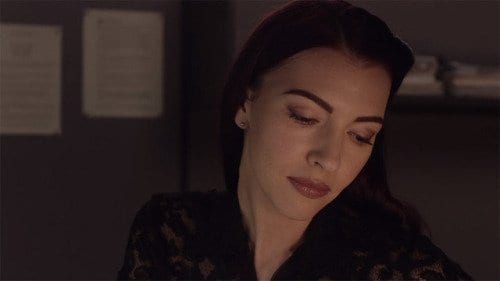
Through assembling her files as an archivist, Tamara is observing the townspeople go through their cycles of self-actualization or otherwise. She is placing content in the order she does. Did she understand that the stories of James, Big Ed, Nadine, and Norma were putting exactly into practice Jacoby’s honed message of personal accountability? Maybe not explicitly, but part of her must have; otherwise why would that success story have been part of Lawrence’s case file?
In the plot of her own story, Tamara writes a section called “Final Thoughts” to Gordon while on a plane heading away from Twin Peaks. She writes “…a core fundamental of human existence is wonder—and its analogue is fear. You can’t have one without the other, flip sides of the coin.” Tamara has absorbed Margaret’s message, learned the path of Cooper’s Double, and synthesized the two together into Tamara’s own lessons.
She asks if the evil in us is real, and “How do we hold both fear and wonder in the mind at once? Does staring into the darkness offer up an answer, or resolution?” Later, she writes this: “The only answer I can console myself with is this: What if the truth lies just beyond the limits of our fear, and the only way to reach it is to never look away? What if that is why we must keep going, why we can never quit trying to overcome it in every moment we’re alive?”
She waxes poetic about how easy it is to quit, to squander life a thousand different ways. Then she says the experience she had while assembling the dossier has changed her. And she ends the book, echoing the best of Dr. Amp, echoing the best of Margaret, with this:
“…when it’s all stripped away and you realize you’re the only one who can put the pieces of yourself back together, by yourself, alone—no easy answers from a book, song, or movie or the reassuring words of someone older and “wiser”—” and here I interrupt to say the mention of a book could be Final Dossier, the song anything from Twin Peaks soundtracks, the movie being Season 3, and the someone older and with-sarcastic-quotes wiser could be Frost mentioning himself in a don’t-get-cocky move, “I’m noticing it has a tendency to focus and sharpen the mind, and strengthen the will to live constantly with all my senses wide open to the here and now.”
Her final conclusion is: “We mustn’t give up.” “Ever.”
This book has given us tools and case studies to help with this perseverance, even when we’re stuck going it alone after Twin Peaks runs out of stories for the second time in under 30 years. (Note how we’re leaving Twin Peaks for the second time just like Dale….would I put it past Frost to make an intentional connection or comparison?)
Is this the actual end? Will we see Cooper’s final alchemically-formed self one day? Only time will tell us that, but as we’ll explore deeply in Part 3 of this Deep Dive series, things go in cycles all the time. There’s good odds we’ll see more enlightenment hit our bookshelves or screens before our proverbial logs turn gold.


